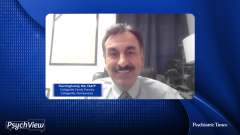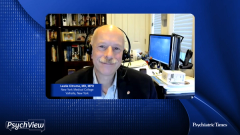
Non-pharmacological Treatment Options for Insomnia:
Experts highlight cognitive behavioral therapy for insomnia (CBTI) and sleep hygiene as nonpharmacological approaches to the treatment of insomnia.
Episodes in this series

Paul Doghramji, MD, FAAFP: Let’s talk about some treatment considerations and also some monitoring. Let’s highlight some factors that impact the treatment selection of insomnia and choosing between, let’s say, nonpharmacologic and pharmacologic options. Are there nonpharmacologic options that we have to treat insomnia?
Leslie Citrome, MD, MPH: Absolutely. There’s CBTI, cognitive behavioral therapy for insomnia, which is a preferred treatment when you have access to it. It may take a little longer than a pharmacologic intervention to start to work, but its effects can be enduring. The problem I have in my community is that there aren’t enough skilled practitioners of CBTI, so access may be limited in that regard. There are some CBTI apps available, so that can be helpful as an adjunct to performing CBTI. That’s called CBT-i Coach. It’s a smartphone app that was developed by the US Department of Veterans Affairs, released about a decade ago, and people do like it. That is available out there but needs a little extra help from the clinician in terms of navigating it. So there’s certainly that.
Sometimes people ask me, what about sleep hygiene? Well, sleep hygiene is not a treatment, sleep hygiene is a way of managing a healthy lifestyle. But once you have insomnia disorder, sleep hygiene is not going to be effective alone, and you’re going to need to do something else. Sleep hygiene is number 1 in terms of the advice I give my patients about keeping a regular sleep/wake schedule. Reducing noise in the bedroom, blocking out light, removing electronic devices from the bedroom as well, avoiding daytime napping, and avoiding alcohol, nicotine, and caffeine before sleeping. Avoiding eating dinner late is also an important point to make. Although sometimes people like to eat dinner late and then they feel kind of tired after eating. It’s a terrible idea, especially as one gets older when you also have reflux coming into the picture. Then regular exercise is important, and stress management is also part of sleep hygiene. But sleep hygiene alone is not going to treat insomnia disorder.
Paul Doghramji, MD, FAAFP: As far as cognitive behavioral therapy, I think this is going to be pretty foreign to a lot of primary care providers. Are there any tips on how one can get a therapist who does CBTI, or is this something that a patient has to look for and get themselves? Can you give some options there?
Leslie Citrome, MD, MPH: I find it very helpful to know what sleep centers are in your community. Sleep centers, in their heyday, were the only place you could get a sleep study done. Now we have home sleep studies that are primarily used, but these organizations still exist. You have specialists in many communities that have a full array of different specialty areas that are offered at that sleep center. That may include psychologists skilled in CBTI. So, I wouldn’t give up, you just have to do a little homework.
Transcript edited for clarity
Newsletter
Receive trusted psychiatric news, expert analysis, and clinical insights — subscribe today to support your practice and your patients.










